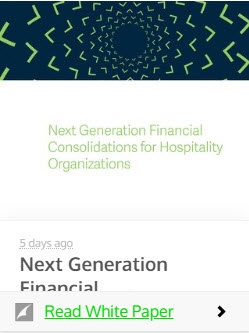
The financial consolidation process has long been a challenging one for hospitality companies. Thankfully, with Sage Intacct hospitality software, accounting teams are now automating this process. Hospitality accounting teams used to take months or weeks to consolidate, assemble, validate and report on data. Sage Intacct for hospitality companies dramatically reduces this time to hours or fewer.
Multi-location hotel, restaurant, and other hospitality companies often consist of separate multi-entity organizations such as decentralized payables, inter-entity transactions, multiple currencies, global consolidations and more. As growing hospitality companies add more entities, the complexities grow as well.
 Here are some of the top hospitality corporate consolidation challenges:
Here are some of the top hospitality corporate consolidation challenges:
There are generally 4 steps to the multi-entity hospitality company consolidation process without using a system like Sage Intacct for hospitality software automation:
Cloud hospitality software financials, like Sage Intacct, reduces errors and preserves financial reporting integrity by automating checks and balances and account reconciliations. In a recent study by Financial Executives Research Foundation and Robert Half, more than 57% of companies manually reconcile accounts. Difficult challenges can arise when late entries or other adjustments get posted and this process is repeated.
No one disputes that the old way of preparing a consolidation no longer works, it's extremely inefficient and comes with greater risk. Reliance on spreadsheets and manual procedures is what in reality holds many finance functions back from playing greater strategic roles in their organizations. While clinging to the manual processes and spreadsheets of the past are comforting for many finance people, it’s important that everyone recognizes that approaches to financial consolidation have advanced significantly in recent years. There is a better way to design and architect your consolidation process.
Contact us if you have questions about business care or need personalized support from our team of Sage Intacct technical experts.
Most restaurant or franchise leaders feel the same way: Theyhave the data. They just never get it...
Equation Technologies
United States: 533 2nd Street Encinitas, CA 92024
Canada: #301 - 220 Brew Street Port Moody, BC V3H 0H6
Phone: 866.436.3530 • E-mail: info@equationtech.us
Equation Technologies ©2016